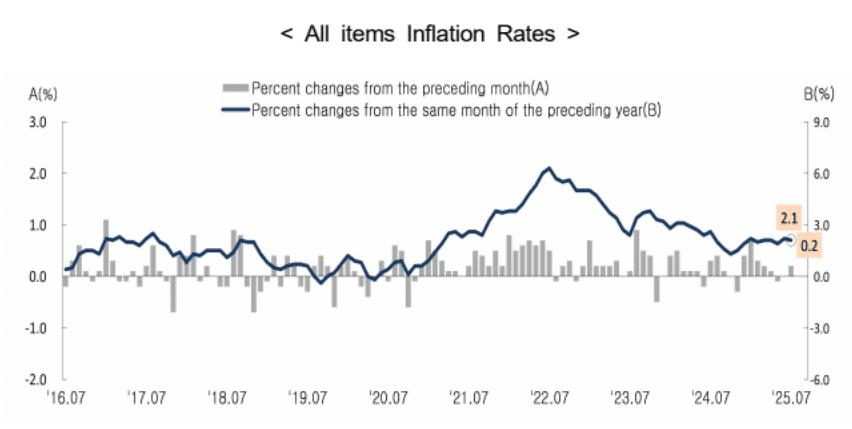MNI BOK WATCH: Board Likely To Hold, Q4 Rate Cut In Focus

The Bank of Korea board is expected to hold the base rate at 2.50% on Thursday, with observers forecasting an initial cut in the fourth quarter as the economy absorbs the impact of new U.S. trade measures.
Bank officials remain cautious, however, amid rising housing prices, household debt, and financial stability concerns, which will weigh on any future rate cuts.
The board last delivered a 25 basis cut at the May 29 meeting, bringing cumulative easing since October 2024 to 100bp, and held steady at its most recent meeting in July. (See MNI BOK WATCH: Governor Cautiously Flags Cuts)
“The economy is improving and there are no signs of worsening now, but the impact of U.S. trade policy will emerge going forward,” said an expert familiar with the bank’s thinking. The focus has shifted to how this will be reflected in the outlook for growth and inflation, the expert added.
The BOK's focus has shifted to how it factors trade impacts into its growth and inflation outlook, the expert said, noting the bank is not yet ready to cut.
FALLING INFLATION
Another BOK expert noted, while inflation risks have eased supporting lower rates, housing and debt dynamics argue against an imminent move. The bank will weigh the trade impact against risks from rising housing prices and household debt before considering a rate cut, he added.
South Korea’s GDP grew 0.6% q/q in Q2, reversing a 0.2% contraction in Q1, while July CPI slowed to 2.1% y/y from 2.2%. (See chart) The Asian Development Bank has cut its 2024 growth forecast to 0.8% from 1.5%, and the Korea Development Institute warned in July of “subdued” conditions amid construction weakness and deteriorating external demand.

Officials are also watching the effects of President Lee Jae Myung’s KRW31.8 trillion supplementary budget, which includes cash handouts of KRW150,000-550,000 per citizen – depending on income level and place of residence – to boost consumption.
However, trade tensions also remain a major headwind. Under a deal announced July 30, South Korean exports to the U.S. face a 15% tariff, while Seoul pledged to buy USD100 billion of U.S. liquified natural gas and energy products, and contribute USD350 billion to a U.S.-controlled investment fund, according to President Donald Trump.
The BOK board will also meet on Oct 23 and Nov 27 this year.